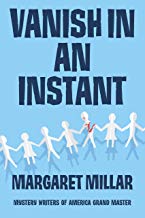Vanish in an Instant by Margaret Millar
Tags: crime-fiction,
Margaret Millar’s Vanish in an Instant opens with a rich, cranky old woman arriving at the Detriot airport in December, 1950 to try to extricate her spoiled daughter, Virginia, from some trouble. It takes a chapter or so for us to learn that the trouble is the violent murder of a local philanderer with whom Virginia was having an affair.
Millar has the reader and most of the characters off balance from the beginning, creating an instant air of suspense that continues to deepen throughout the book. Virginia is in jail when the book opens, but the sheriff hasn’t yet charged her with a crime because he’s not one hundred percent sure that she did it. Neither is she. She was so drunk the night of the murder, she doesn’t remember anything.

Virginia’s mother, the stuffy and self-deceiving Mrs. Hamilton, has hired a lawyer, Eric Meecham, to help her daughter. Meecham is not a criminal defense attorney, but he is intuitive, tenacious, and well-connected, as any detective should be.
His first task is to get Virginia out of jail. As he’s working on that, he comes across a number of mostly downtrodden characters, each of whom has information that only deepens the mystery surrounding the murder. The puzzle of the characters is what makes this book so intriguing. Our understanding of their motives, their relationships to one another, and their whereabouts on the night of the murder keeps changing. In that regard, the book is like an Agatha Christie novel.
I can’t help comparing this book to the work of Millar’s husband, Ross Macdonald. I recently read Black Money, in which the lead female character was also a rich young woman named Virginia. Both Millar and Macdonald were top-selling critically acclaimed authors, and I can see why this book would have been popular in its day. Somehow, though, it seems dated now, while Macdonald’s work, though it describes a specific time and place in American history, has a timeless air.
As in Macdonald’s work, the journey from mystery to solution is long and winding. The world Millar creates is a little tighter than those of Macdonald. The solution to her mystery doesn’t reach across generations or out to peripherial characters introduced late in the story.
A few things contribute to the dated feel of Millar’s work. The dialog of the more educated characters (Mrs. Hamilton, Virginia, Alice, and Meecham) is more formal that anything you’d hear in the US today, while the dialog of the less educated characters sounds like it came from a 1940s movie script. Millar did write for Hollywood, and you can hear the scriptwriter in her characters’ speech. While the dialog of the two different classes may be accurate, its distance from the way we speak today makes it feel like it came from a world that no longer exists.
The character of Alice, whose sole goal is to marry and please a man, may also be an accurate portrayal of a type that once existed in a world where young women had few career options. But again, that reality is so far from today’s world, it makes the book feel dated.
Finally, there is Eric Meecham himself. He’s an interesting character, to be sure, but he acts and talks more like a film character than a real person. You can’t help but see him in black and white putting on his hat to go out as he speaks in the clipped, mannered cadence of Cary Grant. The way he talks to people, unafraid to step on their feelings and never feeling any compulsion to explain himself, suggests a sense of privilege that no longer exists.
None of the book’s dated elements are shortcomings, but they may help explain why Millar’s books, which were as popular in their time as Macdonald’s, are no longer as widely read. Both Millar and Macdonald are perceptive and empathetic. Their works are full of people living on the fringes of society, or living in the center of society and yet somehow isolated by their secets.
Millar’s strengths, at least in this book, include description and characterization, complex plotting, psychological insight, empathy, and an unusual gift for metaphor. Her description of the perennial loser, Hearst, is a good example. When Hearst insists to Meecham that some day he’ll make it to California, Meecham reflects:
All Hearst’s days were some days, he thought. There was no definite tomorrow or week after next, just a shady avenue of some days.
Millar was a Grand Master of the Mystery Writers of America, and this book shows why. If you enjoy an Agatha Christie type whodunnit and a Raymond Chandler type detective story, you’ll like this one.